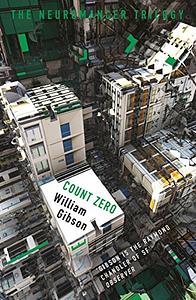You need to sign in or sign up before continuing.
Take a photo of a barcode or cover
I listened to the audiobook, read by Jonathan Davis. A really good rendition.
Written in 1986, its aged superbly.
I couldn't remember much of Neuromancer when I read this. I think it would have made it a richer experience to have read then more closely together.
But... I'm going to go back an re-read Neuromancer now :D
Written in 1986, its aged superbly.
I couldn't remember much of Neuromancer when I read this. I think it would have made it a richer experience to have read then more closely together.
But... I'm going to go back an re-read Neuromancer now :D
Marked improvement in world building, storytelling, and character development from Neuromancer.
3.5
Decent book. I still like the first one better. It’s a fun thriller, lot of explosions and cool lingo. Felt like the plot lacked substance at times but still worth a read.
Decent book. I still like the first one better. It’s a fun thriller, lot of explosions and cool lingo. Felt like the plot lacked substance at times but still worth a read.
slow-paced
This had the same elements I enjoyed in Neuromancer, but for some reason, this one didn't click for me. I spent the whole book just having above disinterest and boredom.
adventurous
dark
mysterious
fast-paced
Plot or Character Driven:
Plot
Strong character development:
Yes
Loveable characters:
Complicated
Diverse cast of characters:
Yes
Flaws of characters a main focus:
Complicated
adventurous
challenging
mysterious
tense
fast-paced
Plot or Character Driven:
Plot
Strong character development:
Yes
Loveable characters:
No
Diverse cast of characters:
Yes
Flaws of characters a main focus:
No
Less mind-boggling than Neuromancer but not necessarily a negative. It reads far more smoothly and still has a unique quality that I can’t put my finger on but is decidedly good
adventurous
challenging
mysterious
tense
medium-paced
Plot or Character Driven:
Plot
Strong character development:
No
Loveable characters:
Complicated
Diverse cast of characters:
Yes
Flaws of characters a main focus:
Yes
I admire Gibson’s choice to avoid retreading material from Neuromancer. It’s too bad that the parts of Count Zero that do are the strongest.
If you have a setting so strong it defines a genre… why spend so much time exploring other corners of the world? Even Gibson doesn’t seem all that interested in Marly’s plot line from the way he writes it, so it’s unsurprising that his glimpse at the fine art world of the future doesn’t amount to much.
Bobby’s stuff is better; Barrytown is a worthy expansion of the Sprawl that feels of a piece with his vision. It’s just not quite enough to disguise that the thread consists mostly of a passive audience cipher receiving exposition dumps on lore that doesn’t really fit tonally with what the rest of it is doing - the “hoodoo” stuff here seems like a superior revision of Neuromancer’s weird Rastafarianism as a vehicle for depicting the influence of technology on spirituality, but the “Loa” themselves as full-on scriptural deities speaking in verse is both less believable and less intimidating than Neuromancer’s simultaneously more human and more alien AI.
But Turner’s story…
Though it’s now better know for androids and enhancements, Japanese mega corporations, and netrunning, the way that Gibson (and Ridley Scott) really invented cyberpunk was by infusing dystopian sci-fi with urban noir. That’s maybe even more visible in Count Zero’s A-plot than it was in Neuromancer: the labyrinthine double-cross laden plotting, a string of broken women all forbidden for different reasons, everything starting from a job gone wrong. And Turner himself has much more in common with hard-boiled PIs than Case or Molly; a consummate professional whose loss and isolation seem to have stripped him of his compassion, but his personal code will not falter. It’s Turner’s story that provides both the greatest thrills and the most piercing moments of heartbreak. One can’t help but wonder… why bother with the other stuff?



